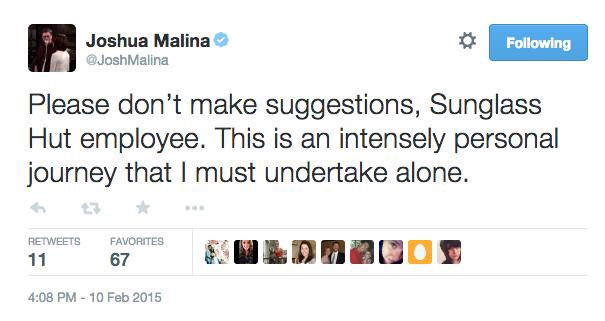The Best Start-Ups and Innovative Companies

OK so sometimes we have harsh words around around here for certain retailers (Wal*mart, Amazon) and other newfangled “disrupters” (Uber, Handy). That is not to say we’re against innovation in the marketplace. Or against commerce in general. In fact, I’m very curious as to people’s favorite new ways to buy things. Do you have a close-to-your-heart company or brand — one that you like not merely because you grew up with it, but because it makes your life better? Has Etsy changed your gift-giving routines? Did you not know how good shaving could be before Harry’s? Are you a regular at Bed Bath & Beyond?
Fast Company’s #1 choice is the hipster glasses purveyor Warby Parker.
But Warby Parker has avoided this fate [burn out] — not thanks to its clever vertically integrated, buy-one-give-one business model, but because of its founders’ fanatical focus on brand and execution. “We’re often asked why Warby has been successful,” co-CEO Neil Blumenthal says. “If we sum it up in one word, it’s deliberate.”
You wouldn’t know it, except by looking at the results. Annual revenues at the five-year-old company are “well over” $100 million, according to a person familiar with its finances. Meanwhile, its two CEOs, who founded the company with two other Wharton classmates, have transformed what was a niche web shop into the hottest thing in offline retail, with 10 stores so far and sales-per-square foot figures that rival those of Tiffany & Co. “When we launched, a lot of people bucketed us as an e-commerce company, but we never thought of ourselves as an e-commerce company,” Gilboa says. “The only products we sell now are glasses, but we think our brand can stand for much more than that over a long time period.” That’s an ambition that many e-commerce companies have talked about. Warby Parker is the only one so far that seems likely to pull it off.
To give you a sense of how momentous the magazine’s choice is, they also include Google, Apple, and Instagram in their top 5 Most Innovative Companies. Just, you know, below the dudes who sell you frames.
Conspicuously absent: any dating site and GoPro, the little portable adventure camera you clip to your helmet before you go sky diving in Tanzania. From the New Yorker article about the tech phenomenon:
GoPro shots are often characterized by one-sided conversation, the rattle of straps, or the beatbox fusillade of water and wind. This is one reason a polished GoPro edit is usually set to music. Still, the clarity of the picture, which renders trees, waves, seracs, clouds, and cliffs with a kind of lysergic radiance, flatters the natural world. …
Becoming a multibillionaire may not be as rare an occurrence these days as riding a mountain bike through a herd of elk, but it is nonetheless a feat worthy of documentation. GoPro’s offering price, of twenty-four dollars a share, valued the company at around three billion dollars. Woodman’s father, Dean Woodman, a hale gent of eighty-five who had himself once been a very successful entrepreneur, as a founder of the now defunct San Francisco investment bank Robertson Stephens, and who early on had lent his son two hundred thousand dollars to finance GoPro, came up to him and said, “You look like a rock star.”
“I play one on TV,” the son said. He is known as the Mad Billionaire, for his hyperactive antics and taste for adventure sports. But when it came time for him to talk, just before the opening, he teared up, presumably at this culmination of so much hard work — years of risks rewarded, doubts dashed, overpromises met, and paternal expectations exceeded. He recovered himself for the cameras. “I’m fired up!” he called out to his employees. “You fired up?”
Er, yeah. Getting glasses over the Internets is maybe something more of us can relate to.
The process used to be a pain, and it still is, for some: not just expensive but time-consuming and a drain on self-esteem. I haven’t tried Warby Parker, myself. When I need to get glasses, I go to the same great small local store, try on everything in the case, make faces at myself in the mirror, and then, with resignation, try it all on again, while being nurtured and cajoled by the salespeople. I can’t imagine replicating that experience at home. On the other hand, if you don’t have a great small local store filled with salespeople of infinite patience, or if you have more natural decisiveness and a healthier ego than I do, the online alternative must be quite enticing.
Or if you’re Joshua Malina:

Support The Billfold
The Billfold continues to exist thanks to support from our readers. Help us continue to do our work by making a monthly pledge on Patreon or a one-time-only contribution through PayPal.
Comments